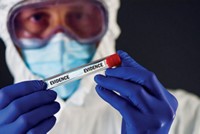Advertisement
Grab your lab coat. Let's get started
Welcome!
Welcome!
Create an account below to get 6 C&EN articles per month, receive newsletters and more - all free.
It seems this is your first time logging in online. Please enter the following information to continue.
As an ACS member you automatically get access to this site. All we need is few more details to create your reading experience.
Not you? Sign in with a different account.
Not you? Sign in with a different account.
ERROR 1
ERROR 1
ERROR 2
ERROR 2
ERROR 2
ERROR 2
ERROR 2
Password and Confirm password must match.
If you have an ACS member number, please enter it here so we can link this account to your membership. (optional)
ERROR 2
ACS values your privacy. By submitting your information, you are gaining access to C&EN and subscribing to our weekly newsletter. We use the information you provide to make your reading experience better, and we will never sell your data to third party members.
With the release of the National Academy of Sciences report "Strengthening Forensic Science," the committee's two-year journey has ended (C&EN, Feb. 23, page 7). I offer a few suggestions to those who will influence the future.
The forensic science community should soon recognize that concerns over the reliability and variability of forensic evidence are not going to blow over. Community members must quickly get past the emotions and organize coherently to lean into the challenges, gaps, and opportunities for constructive change.
Forensic science isn't the only discipline that requires self-examination; the law-enforcement, legal, academic, and public policy communities also must resist the easy default of finger-pointing at forensic science. Any one will fail without the others, and all have contributed to the current state of forensic science.
The U.S. tends to react to situations like this by throwing a lot of money at the problem. Forensic science will not be fixed in a day or even a year. As the dust settles from congressional hearings and copious media interpretations of the report, we must take up the task with the proper resources, plans, leadership, organizational processes, and management systems in place.
A 10-year national strategy and plan founded on valid national requirements and priorities should be created, validated, and overseen. The strategy, operational plan, and measures of effectiveness must be in place before any new dollars are spent.
Leadership, professional responsibility, and focus are required at all levels from the Obama Administration, Congress, community stakeholders, and even observers and critics. Success will be realized by putting people in charge who have proven they know what they are doing. Political connectedness is important for success but should not be the primary or even secondary entry on the résumé.
Forensic science is a complex system and should be pursued from now on as an integrated system of science, law, and policy. If this does not occur, failure or severe disappointment is likely. There are no single-point solutions for anything that forensic science and its stakeholders face.
Forensic science is much more today than we see in our courtrooms, media, or entertainment. It is being developed and applied to bioterrorism, nuclear security, international conflict, and terrorism. "Not having to go to court" is not a justification for not providing forensic science that is accurate, reliable, repeatable, properly interpreted, objectively communicated, and defensible, no matter the customer.
Like many challenges our country faces, improving and advancing forensic science is a national priority. Let's get it right.
Randall Murch
Former deputy director and forensic scientist, FBI Laboratory Adjunct professor, School of Public & International Affairs, Virginia Tech
Alexandria, Va.
More Latest News
October 28, 2011
Speedy Homemade-Explosive Detector
Forensic Chemistry: A new method could increase the number of explosives detected by airport screeners.
Solar Panel Makers Cry Foul
Trade: U.S. companies complain of market dumping by China.
Novartis To Cut 2,000 Jobs
Layoffs follow similar moves by Amgen, AstraZeneca.
Nations Break Impasse On Waste
Environment: Ban to halt export of hazardous waste to developing world.
New Leader For Lawrence Livermore
Penrose (Parney) Albright will direct DOE national lab.
Hair Reveals Source Of People's Exposure To Mercury
Toxic Exposure: Mercury isotopes in human hair illuminate dietary and industrial sources.
Why The Long Fat?
Cancer Biochemistry: Mass spectrometry follows the metabolism of very long fatty acids in cancer cells.



Join the conversation
Contact the reporter
Submit a Letter to the Editor for publication
Engage with us on Twitter